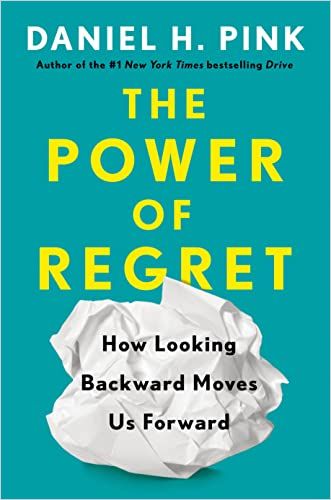Best-selling author and psychologist Daniel H. Pink delivers an engaging and thought-provoking exploration of regret. Everyone experiences this deeply human – and profoundly painful – emotion; Pink makes an intriguing case for regret as a force for good.

To Regret Is Human
Most Americans don’t handle regret well. Positive thinking, a forward-looking culture and an almost compulsive sense of innocence have fueled economic progress and technological innovation – but these traits also contribute to Americans’ deep discomfort with negative emotions. Don’t look back, don’t dwell, don’t wallow.
In recent years, however, Black Lives Matter and other social justice movements have impelled many Americans to reckon with the sins of the past – both societal and personal. Amid this changing moral landscape, a refusal to examine your own ill-advised past choices begins to sound conscienceless.
Psychologist and former Al Gore speechwriter Daniel H. Pink has penned best-selling books on motivation (Drive: The Surprising Truth About What Motivates Us), sales (To Sell Is Human: The Surprising Truth About Moving Others) and timing (When: The Scientific Secrets of Perfect Timing). In his most recent volume, Pink tackles regret, reconceptualizing what he calls humanity’s “most pervasive and most powerful” negative emotion as an indispensable spur to living a better life.
Americans are over-indexed on positive emotions…We feel like a good life is a life devoid of any kind of pain and discomfort, and we’re wrong. Daniel Pink
In a Washington Post article, Pink describes the book’s genesis as stemming from his own history with regret. During his daughter’s 2019 college graduation ceremony, Pink’s thoughts drifted to his own college days and his regrets about those years: He wished he’d studied harder and been more open to taking risks. As he discussed these feelings with others, Pink found, to his surprise, that people were interested. They wanted to talk about their own regrets, too.
This experience led Pink to undertake 18 months of research on the subject, including the creation of a website for the World Regret Survey, where people can contribute stories of their own regrets. More than 16,000 people from around the world have participated so far, and Pink peppers the book with quotes and anecdotes drawn from their stories.
Pink also teamed up with survey researchers in 2020 to undertake the American Regret Project, polling a representative sample of 4,489 Americans. These two projects form the foundation for The Power of Regret. Pink further draws on a growing body of science on the topic, particularly in the fields of psychology and neuroscience.
Pink describes regret as a process, not a single emotion. This process begins when people reflect on the past, time-traveling by mentally leaving the present moment. Then, they rewrite the future, imagining an alternate reality shaped by a past in which they behaved differently. Last, negative emotions – such as sadness and despair – arise as people compare their current reality with the one they imagine, and then exacerbate the torment by blaming themselves.
A dark emotion that sheds light
In Pink’s view, regret’s power derives from the role it can play in revealing people’s core values and illuminating a path to a fulfilling life. In the meaty middle section of the book, Pink discusses the major insights he derived from his research. These findings show how regret can hold the key to its own resolution. By examining their regrets, people can act to allay them and forestall them in the future.
The four core regrets operate as a photographic negative of the good life.Daniel Pink
Regret, Pink found, comes in four flavors, or categories: foundation regrets stemming from lack of foresight; boldness regrets arising from risk aversion; moral regrets tied to ethical failures; and connection regrets following from unfulfilled or broken relationships. Knowing these broad causes of regret – and studying its specific sources in their own lives – can open people’s eyes to the importance of self-responsibility, bravery, ethics and relationships. Identifying a regret’s roots enables people to live more meaningful and fulfilling lives than would be possible without the lessons of regret.
A prescription to cure regret
Pink devotes the book’s third and final section to describing remedies for regret – how to take the sting out of regrets you currently suffer and how to reduce regret in the future.
Pink recommends taking action where possible to reverse the damage caused by unwise decisions. If you’ve harmed someone, offer a sincere apology; if you’ve harmed yourself, do what you can to undo the injury. Where action isn’t possible, Pink recommends taking the “at least” approach: Highlight the ways the situation could have been worse.
Regret is not dangerous or abnormal, a deviation from the steady path to happiness. It is healthy and universal, an integral part of being human.Daniel Pink
To relieve the emotional torment of regret, Pink offers a three-part prescription: First, confess the regret by writing it down or sharing it with others. This self-disclosure can often break the cycle of rumination. Second, treat yourself with compassion: Everyone makes mistakes. Self-compassion can bring about positive behavior changes, whereas punishing yourself – or falsely exonerating yourself – tends to perpetuate unpleasant feelings. Third, gain perspective on the situation by distancing yourself from it. Use strategies such as talking about the regret in the third person or imagine it’s a friend and not yourself suffering from the regret.
A life without regret?
In Pink’s view, regret is an indispensable emotion that keeps us in touch with our humanity. It’s tempting to want to escape or avoid the negative feelings that come from knowing your present and future life might have been more optimal if you’d chosen better or behaved differently – yet it’s crucial to harness the teaching power of regret. Believing yourself free of regret can be symptomatic of delusional or wishful thinking, and it inhibits growth.
But despite the growing evidence that facing negative emotions can help people allay and avoid them, it remains a rare practice. In an interview for GQ, Pink points out that most Americans have never been taught how to recognize and work through their negative feelings. The results, in Pink’s view, include depression and other mental health challenges, particularly among youth. “We’ve been fed a bill of goods about endless positivity,” Pink says.
Pink notes that in the results of the World Regret Survey, regrets about hurting others outnumber all other categories. And those regrets often center on bullying. “I had so many people talking about bullying I couldn’t even believe it,” Pink said. “It suggests stamped somewhere in our DNA and buried deep in our souls is the desire to be good.”
For anyone who suffers from regret – so, everyone – Pink’s research offers relief and hope, along with nuanced understanding of a most difficult and misunderstood emotion.














